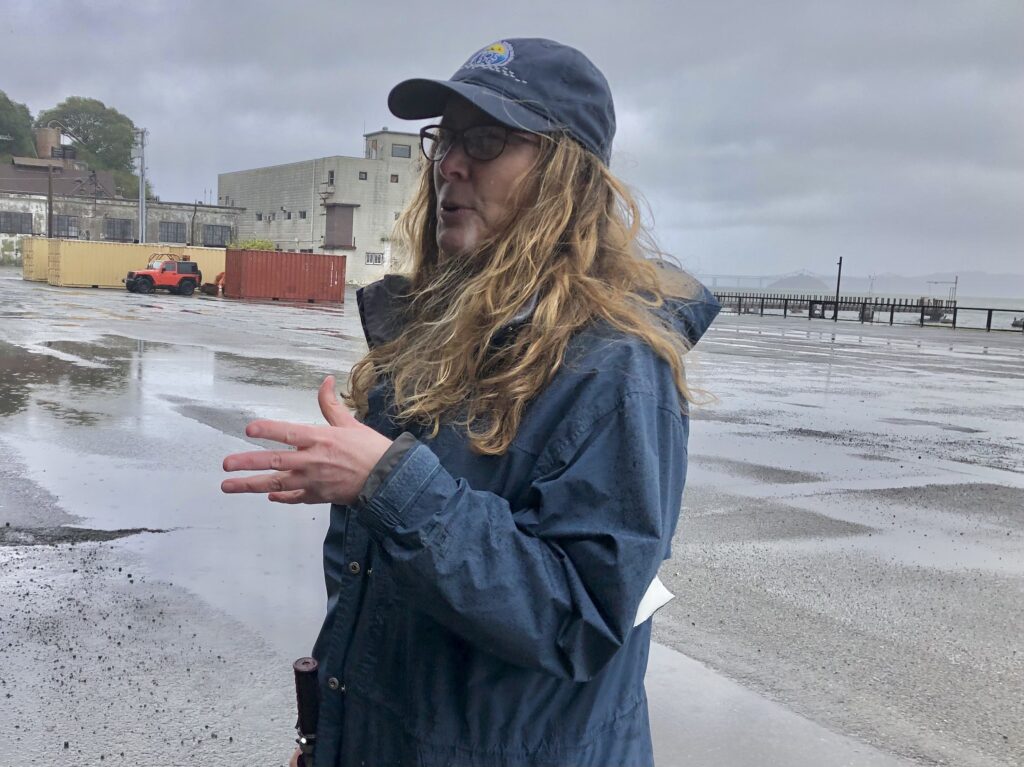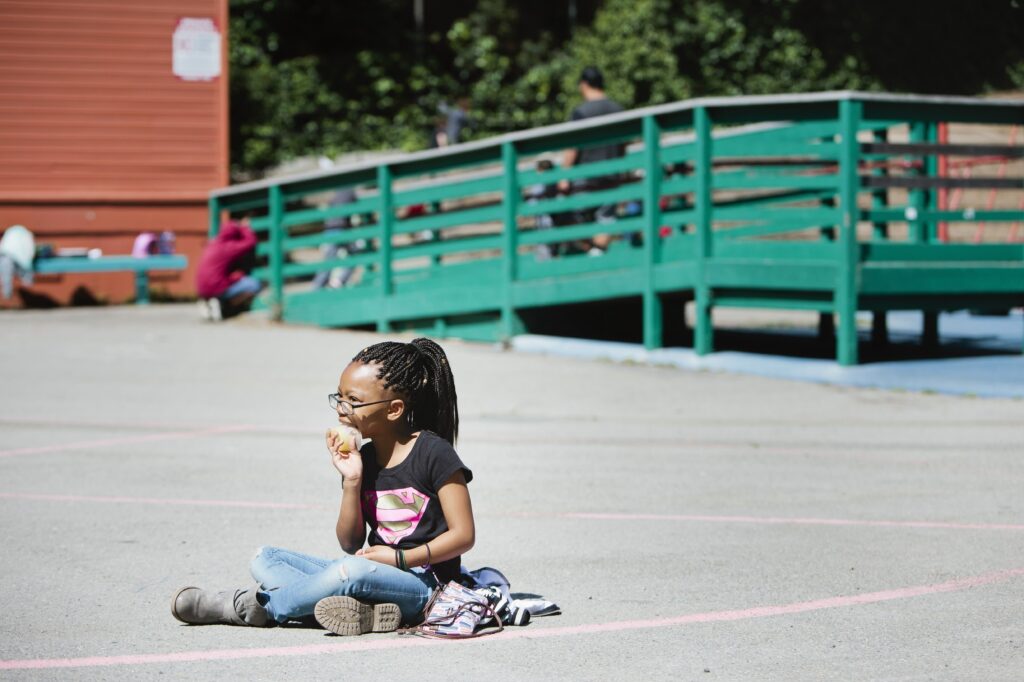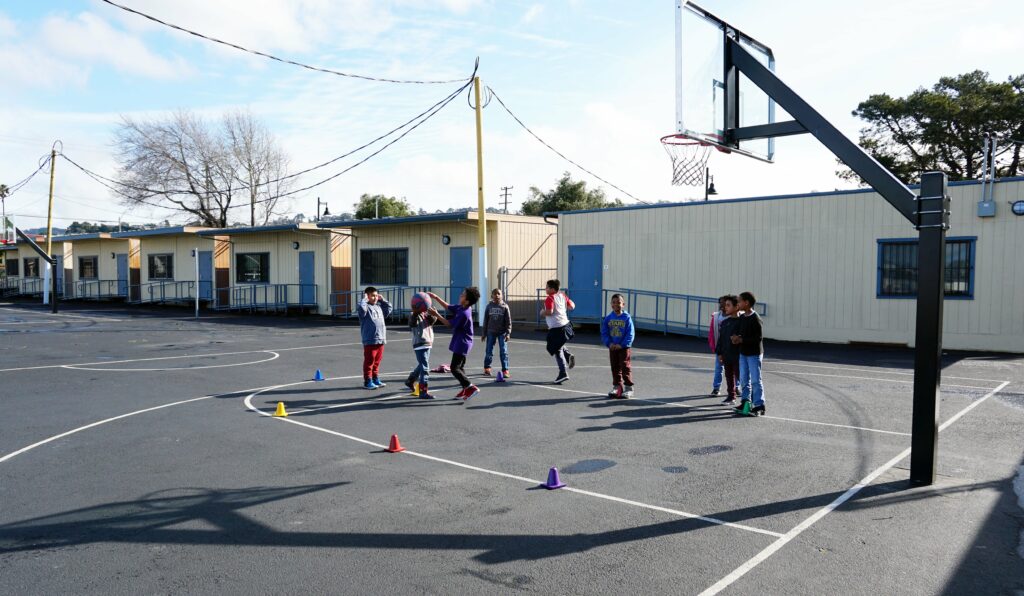
Katharyn Boyer, the interim executive director of San Francisco State University’s Estuary and Ocean Science Center, walks the grounds of the Romberg Tiburon campus on Feb. 13, 2025.
Amy DiPierro, EdSource
Top Takeaways
- University says attempts to make the Romberg Tiburon campus financially self-sustaining have fallen short.
- The likely closure shows the challenges facing some Cal State campuses amid tepid enrollment, anticipated state budget cuts and a maintenance backlog.
- One researcher’s specialty is studying eelgrass, a plant important to sustaining the bay ecosystem.
To the untrained eye, the eelgrass in San Francisco Bay is unremarkable, a slimy marine plant easily mistaken for seaweed. But to the ecologist, it is essential: a natural carbon storage system, a hedge against climate change, and a protector of shorelines threatened by rising seas.
That’s why Katharyn Boyer, a biology professor who leads San Francisco State University’s estuary and ocean science center in Marin County, has spent much of her career studying how to restore and maintain the bay’s underwater meadows of ribbon-like eelgrass. It’s an effort growing more urgent as climate change nudges sea levels ever higher.
Working for the past two decades at the marine research campus, a 13-mile drive north of San Francisco, Boyer and her colleagues have trained the next generation of scientists and conservationists. Budding researchers hone their field skills at the site, where saltwater tanks act as a temporary home for eelgrass plants waiting to be replanted in the bay. “You really have to treat the plants well while you’re doing this restoration work,” Boyer said. “Having this nice, cool, natural supply of water — it’s the perfect kind of condition.”

But the 53-acre marine research campus where Boyer works could soon close as the university contends with declining enrollment and a likely cut to state funding.
San Francisco State says it can no longer afford to keep the lights on at the site, a former Navy base now called the Romberg Tiburon campus. Since the university announced plans to close Romberg Tiburon in February, Boyer has redoubled efforts to secure enough outside funding to save it. As of last week, Boyer said, San Francisco State finance officials have indicated that the funds she has raised are not enough. The site would start to wind down over the coming months unless a last-minute solution emerges.
“You can bring in the grant money, but you have trouble with covering your basic operations costs,” Boyer said while walking the property on a blustery day. “I don’t think it’s a unique problem here. It just has gotten to the point where our university is just struggling so much financially that it’s hard to justify the costs of it.
“That’s very hard for us to take because we think that we do — and we know that the community thinks what we do — is really valuable,” Boyer added, as a gust of wind blew her ball cap from her head.
The plan to close Romberg Tiburon is one sign of how lower enrollments are setting off a financial domino effect at some California State University campuses. While some campuses, especially those in Southern California, attract a growing student body, San Francisco State’s enrollment fell 26% between 2015 and 2024. That means San Francisco State will receive less money not only from student tuition but also from the 23-campus Cal State system. All of that could be crunched further by Gov. Gavin Newsom’s proposal to reduce funding to CSU and the University of California by almost 8%.
Reductions are surfacing in varied forms at CSU campuses. Sports teams and the geology department are among the cuts proposed at Sonoma State University. Cal State East Bay will close its downtown Oakland conference and classroom center when its lease ends in June. Sacramento State, where enrollment is up 2% year-to-year, plans to cut $24 million from its department of academic affairs over the next two years. Even Cal State San Marcos, among the system’s fastest-growing campuses, is offering retirement incentives to manage a tight budget.
Amy Sueyoshi, San Francisco State’s provost, said her campus is “scaling back everywhere,” with at least 30 faculty members leaving each year and only a handful joining to replace them.
“At this point, with our limited resources, it’s actually not OK for us to have so much of our resources flowing in a direction that doesn’t serve our undergraduate students directly,” she said.
Romberg Tiburon — named for Paul Romberg, who was president of San Francisco State when the university took over the site — is also an example of the worsening condition of facilities across CSU. San Francisco State estimates the Romberg Tiburon campus needs about $4 million in critical safety repairs. Such expenses barely scratch the surface of the roughly $8 billion maintenance backlog around the Cal State system.
What happens next to the marine campus is uncertain. Boyer continues to seek donors or nonprofits interested in leasing the site. San Francisco State plans to give all estuary and ocean science faculty an opportunity to relocate to the main campus, though lab space is limited. But Boyer says the transition only guarantees lab space to tenured faculty and may leave nontenured faculty, in effect, “homeless,” complicating things for their graduate students.
“There’s a lot of people’s careers and livelihoods that are at stake,” she said.
A marine lab ‘in the middle of gritty San Francisco Bay’
In mid-February, Boyer walked the grounds of the Tiburon campus wearing a parka and baseball cap, a stadium umbrella tucked under one arm in case the scattered drizzle turned into a downpour. To the north, the ghostly outline of the Richmond-San Rafael Bridge emerged from the fog like a half-finished sketch leading east to the unseen Chevron refinery on the opposite side of the bay.
Marine laboratories tend to be located in remote places, where scientists study life in pristine ecosystems relatively untainted by human interference. Romberg Tiburon breaks that mold.
“This one is in the middle of the gritty San Francisco Bay, with all of the problems of the large population that we have here, all of the impacts that that creates, all the opportunities for restoration and conservation that that creates,” Boyer said.
Boyer pointed out barracks and other holdovers from the site’s past lives as a Navy base, coaling station and nautical training school. San Francisco State established a research beachhead at Tiburon in 1978, taking over ownership from the federal government. Today, researchers work out of Delta Hall, a converted warehouse from the 1940s.

Working along the shoreline makes it possible to offer hands-on classes in wetlands ecology and biological oceanography, including for undergraduates, Boyer said. “It’s an amazing place to do that, because [students] can do experiments here,” she said. “They can develop a hypothesis and test it from start to finish over the course of a semester.”
The marine research campus currently hosts about 30 graduate students, Boyer said, and as many as 100 undergraduates use the Tiburon campus in a typical year. Recent master’s students have landed jobs at places like the Environmental Protection Agency and the San Francisco Bay Conservation and Development Commission. Even with those success stories, Sueyoshi said a master’s program through the estuary and ocean science center has already been discontinued due to a lack of students.
The campus is also showing its age and a lack of upkeep. Signs emblazoned “DANGER” and “RESTRICTED AREA” urge visitors to stay away from buildings whose chipped paint exposes wood beneath.
As recently as 2019, San Francisco State sketched blueprints to redevelop and repurpose buildings on the site. One plan suggested a reinvigorated campus could “amplify SF State’s social justice legacy” and proposed building new housing and academic space while refurbishing existing facilities.
Such ambitions would require a private developer to purchase and invest in the campus, Sueyoshi said, adding that San Francisco State has also explored returning the site to the federal government or persuading other universities to take it over.

‘You can’t just rebuild it’
As the financial pressures on San Francisco State have grown, many faculty at the Romberg Tiburon campus now raise the money to pay their own salaries through state and federal grants, Boyer said, rather than relying on San Francisco State. The Tiburon campus also earns money by leasing space, including an onsite conference center, to third parties.
Entrepreneurial efforts aside, the Tiburon campus still counts on San Francisco State for some important costs, including the salaries of facilities and administrative staff members as well as tenured faculty, a university statement noted.
A tight budget has not stopped San Francisco State from investing in other campus improvements. The university combined funding from CSU and private donors to build a new 125,000-square-foot science and engineering building on its main campus, which opened last year. In April, it unveiled a new student housing project that includes a health center and dining hall, funded in part by a state grant.
But the lack of long-term funding for Romberg Tiburon leaves Boyer’s eelgrass projects in limbo. She expects to continue the work at Tiburon through the fall, “but after this field season, basically, I don’t know,” she said.
A chain of interconnected life relies on eelgrass to thrive. As the ocean absorbs carbon dioxide released by burning fossil fuels, it becomes less hospitable to oysters and, in turn, less welcoming to birds like the appropriately-named black oystercatcher. But beds of spindly green eelgrass capture carbon, creating a refuge for native oysters and a marine buffet for birds of prey.
Once lost, it is an ecosystem that can be labor-intensive to restore. It’s the kind of work that Marilyn Latta, a project manager at the California State Coastal Conservancy, said requires “early mornings, wetsuits, boat access, all sorts of hard work that’s best suited for a shoreline, marine science location on the water” like the Romberg Tiburon campus.
“If we were to lose that expertise,” she said, “you can’t just rebuild it.”




